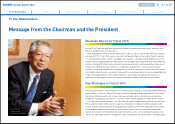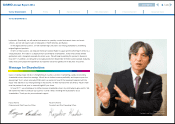Casio 2016 Annual Report Download - page 12
Download and view the complete annual report
Please find page 12 of the 2016 Casio annual report below. You can navigate through the pages in the report by either clicking on the pages listed below, or by using the keyword search tool below to find specific information within the annual report.
Annual Report 2016 / 4611
CONTENTS
To Our Stakeholders Prole Special Features ESG Information Financial Section Corporate Data
The Corporate Governance System
1. System Design
Casio is a company with a Board of Statutory Auditors.
The Board of Directors and the Board of Statutory Auditors
supervise management. Casio is further strengthening
corporate governance by enhancing its executive officer system
and expanding the responsibilities of outside directors.
The Board of Directors delegates most of the authority for
important business execution to enable prompt and efficient
business execution. The Board of Directors makes resolutions
as required by laws and the Articles of Incorporation, as well as
decisions about important business execution matters, using its
vested authority to ensure that it fulfills its supervisory functions.
In addition, Casio has enhanced the management supervision
function of the Board of Directors by establishing the
Nomination Committee and the Compensation Committee,
which include outside directors.
The Board of Statutory Auditors is independent of the Board
of Directors, supervises the business execution of directors
and, without loss of management speed and effectiveness,
takes a corporate governance stance that sufficiently fulfills the
supervisory function.
2. Board of Directors and Directors
The Board of Directors has the function of making management
decisions and supervising business execution, and deliberating
and deciding on important management issues specified by
laws, the Articles of Incorporation and Board of Director
regulations. In order to enhance the efficiency and flexibility of
business execution, the Board of Directors has entrusted
Executive Officers with the authority for items that do not meet
the standards for discussion as prescribed by laws, the Articles
of Incorporation and Board of Director regulations.
In order for the Board of Directors to effectively fulfill its
management supervision function, we believe the Board of
Directors must be composed of members with diverse
perspectives, experiences and abilities. In addition to directors
from within the company who are thoroughly knowledgeable
about the company’s business, the Board of Directors has
outside directors with broad discernment and extensive
experience.
Consideration is also given to the balance among the
members of the Board of Directors for experience and
accomplishment in corporate management and specialization
in the fields of technical development, sales and finance and
other areas.
We plan on maintaining an appropriate number of members
of the Board of Directors so that swift management decisions
can be made.
Currently there are eleven members, two of whom are
outside directors.
The term of directors is one year in order to clarify their
management responsibility and make it possible to swiftly
respond to changes in the management environment.
Internal candidates for director are selected by a Nomination
Committee after discerning that they are persons capable of
fulfilling management responsibilities, have the disposition
required of directors, and have superior achievements,
capabilities and character.
We select several knowledgeable persons to be outside
directors. These outside directors are invited so they can give
opinions and advice to the Board of Directors from many
angles regarding contributions to society in addition to bringing
an outsider’s viewpoint to management and enhancing
transparency of management with the goal of further
strengthening the supervisory function of business execution.
The two outside directors make comments and suggestions
as they see fit to guarantee the appropriateness and soundness
of Board of Director decisions.
3. Board of Statutory Auditors and Statutory Auditors
The Board of Statutory Auditors follow policies and handle
assignments set out by the Board of Statutory Auditors to
ensure sound and transparent business management. In
addition to attending meetings of the Board of Directors and
other important meetings and committee sessions, statutory
auditors fulfill their responsibility to rigorously monitor the
Company’s management processes by speaking with directors
and other managers, receiving reports from them, and reading
the minutes of meetings at which decisions on important
matters were made and related reference material. Statutory
auditors coordinate with outside directors as needed to obtain
information and exchange opinions, and are assigned expert
assistants who support their audit activities.
More than half of the members of the Board of Statutory
Auditors are outside auditors. The Board of Statutory Auditors
includes members with knowledge of finance and accounting in
order to strengthen its audit function.
The current Board of Statutory Auditors is composed of
three statutory auditors, two of whom are outside auditors.
4. Accounting Auditor and Internal Audit
Independent auditing corporations conduct external audits in
accordance with auditing standards generally accepted in
Japan to determine fairness and appropriateness. The Internal
Audit Department monitors the organizational management of
the Company to check that it is appropriate and conforms to
laws and regulations as well as internal standards.
5. CSR Management
In addition, the CSR Committee deliberates on basic policies
and major issues in CSR activities across the Group. This
committee is chaired by the officer in charge of CSR at Casio
Computer Co., Ltd. and includes the officers in charge of staff
function departments, statutory auditors and managers of staff
function departments.
Casio recognizes the importance of responding to the expectations of shareholders and
other stakeholders, swift decision-making, appropriate and efficient business operations,
and enhanced supervisory functions that improve the soundness and transparency of
management in steadily achieving management goals and continuously increasing
enterprise value. We are implementing various initiatives to improve corporate governance.
Election
and
dismissal
Election
and
dismissal
Election
and
dismissal
General Meeting of Shareholders
Coordination
Coordination
Audit
Audit
Board of Directors
Directors: 11
(2 outside)
Internal Audit Department
Accounting
audit
Internal
audit
Internal audit
Oversight
Oversight
Business
Execution
Appointment,
dismissal, and
oversight
Nomination Committee
Compensation Committee
Board of Statutory Auditors
Statutary Auditors: 3
(2 outside)
President and CEO
Business divisions / Group companies
Accounting Auditor
Subcommittees
Executive ofcers
Audit staff
Corporate Governance Framework Director Remuneration
Corporate Governance
Total remuneration by director of submitting company, breakdown of remuneration and number of directors paid
Position
Total
remuneration
(Millions of yen)
Breakdown of remuneration (Millions of yen) Number of
directors paid
Basic
remuneration Stock options Bonus Retirement
benefits
Directors
(excluding outside directors) 337 224 —112—10
Auditors
(excluding outside auditors) 13 13 — — — 1
Outside officers 36 36 — — — 5
Notes: 1. The amount of remuneration paid to directors does not include the employee salaries of directors who also hold an employee post.
2. Remuneration paid to directors in the amount of no more than ¥700 million was approved at the 53rd Regular General Meeting of
Shareholders held on June 26, 2009 (however, the employee salary and provision for directors' retirement benefits reserve transfers are
not included).
3. Remuneration paid to auditors in the amount of no more than ¥70 million was approved at the 51st Regular General Meeting of
Shareholders held on June 28, 2007 (however, the provision for directors’ retirement benefits reserve transfers is not included).
Total remuneration by director of submitting company
Name
Total
consolidated
remuneration
(Millions of yen)
Position Company
Breakdown of remuneration (Millions of yen)
Basic
remuneration Stock options Bonus Retirement
benefits
Kazuo Kashio 147 Director Submitting
company 97 —50 —
Note: “Total consolidated remuneration” is restricted to persons with consolidated remuneration of ¥100 million or more.
























